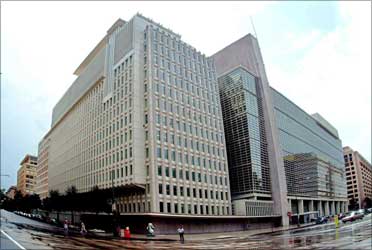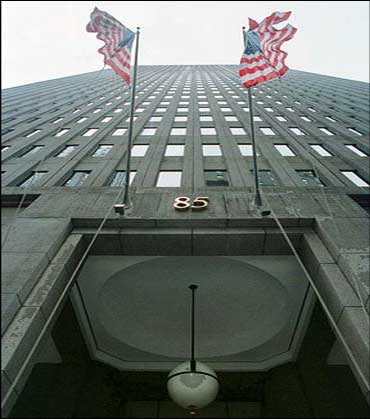 | « Back to article | Print this article |
Does India need the new accounting norm?
Two plus two is four. That is traditional accounting, technically termed as historical accounting.
But the problem with many -- especially those in the capital markets -- is that traditional accounting does not suit their interests.
Naturally some with vested interest require an accounting system where two plus two need to be anything but four. Enter International Financial Reporting Standards (IFRS).
To the uninitiated, IFRS represents a tectonic shift in the grammar of accounting. Naturally the question arises -- what would be the impact of such change in accounting on the other stakeholders in India?
Has there been any impact study on the same before the Government of India and the Institute of Chartered Accountants of India declared convergence of Indian Accounting Standards with the IFRS?
Crucially who drives these changes, who are the potential beneficiaries and probable losers of such change?
Click NEXT to read on . . .
Does India need the new accounting norm?
It is in this context that the 'Report on Socio-economic Impacts of IFRS on Wider Stakeholders in India' authored by Dr Tomo Suzuki and Prof Jaypal Jain, of the Said Business School, University of Oxford, UK, becomes extremely crucial.
The report is said to have been submitted to the Institute of Chartered Accountant of India and is now in circulation (a copy of which was provided to me by some well meaning persons within the ICAI).
This piece seeks to produce some of the salient features of this explosive 'report'.
How this system was smuggled into India
What is extremely fascinating about this report is that the authors raise fundamental questions about IFRS.
How transparent will be the new accounting system? How much debate and consultations were carried out within India before we announced the convergence with IFRS?
Whether IFRS is genuinely as fair and transparent as claimed by its proponents? What is the impact of introducing IFRS in various countries?
Click NEXT to read on . . .
Does India need the new accounting norm?
It is in this connection the authors claim to have carried out several rounds of interviews with 371 stakeholders to reach a collective understanding on the impact of IFRS in India.
While this may not be an exhaustive exercise in the Indian context, it is no doubt the first serious attempt at gauging impact of IFRS on various stakeholders, especially in the context of an inexplicable euphoria spearheaded by the ministry of corporate affairs and cheer-led by ICAI.
That makes the report that much more important and the public debate on the same, extremely significant.
The report points out as to how IFRS remains un-critiqued even to this day in India as much as elsewhere in the world.
Deploring the standard rhetoric used to perceive IFRS as 'high quality, global accounting standards that enhance transparency, comparability and the efficiency of the financial markets in the public interest', the authors point out as to why even the very introduction (forget convergence or full adoption) of IFRS should be critically analysed.
Click NEXT to read on . . .
Does India need the new accounting norm?
The report claims that the repeated use of the term 'high quality' by vested interests is merely terminological warfare.
Interestingly, the report points out to the fact that it not yet proven that IFRS could be stated to be superior to the present accounting system.
The report points out that it seems to be a presumption that such transparency is embedded through fair value accounting -- the bedrock of IFRS.
It further points out to the fact that many stakeholders, including analysts, fund managers, and finance academics, lack in accounting education.
Therefore, once IFRS is characterised with such standard rhetoric as high quality, fair value, transparency, comparability, and efficiency, there is no option but to believe in this rhetoric, or atleast not object to it.
Such rhetoric is difficult to refute because it always draws upon its value in the language itself.
Click NEXT to read on . . .
Does India need the new accounting norm?
For instance, fair value always induced the perception of fairness, regardless of the actual measurement of assets and liabilities in practice, which may be fair or not.
And when psychology takes over, no evidence is required.
Apart from the standard rhetoric paradigm (the report illustrates ten standard methods) explained above, exploring the mechanism in which IFRS has been promoted, the report points out to its dissemination within the small network of top officials in powerful international organisation such as G20, IMF and the World Bank.
And if you think these officials are experts -- hang on -- the report points out that the "knowledge of accounting is significantly superficial or even near-non-existent!"
Yet it is pontification by these institutions that is repeated faithfully by mainstream media which in turn fashions our individual thinking to such issues. And that in turn shapes our collective responses.
After all, who will dare question any high ranking official of a multilateral agency and risk being ridiculed?
Click NEXT to read on . . .
Does India need the new accounting norm?
The report categorically points out to the fact that most members of the ICAI were unaware of the decision of the institute to converge with IFRS, while exposing the role of the then president of the ICAI (2007-8) in announcing convergence, "without proper consultation and procedure."
The paradox is telling -- IFRS, ostensibly sought to be introduced by an accounting Regulator avowedly wedded to improving transparency was in effect smuggled in the most undemocratic, even stealthy manner!
And that seems to be the formulae of introducing IFRS worldwide -- by neutralising important men and women in position. And the standards response by the powers that be within the institute to pointed questioning is always to maintain a sphinx like silence.
Unknown to many, the International Accounting Standard Board (IASB) -- the global accounting body that sets up these standards -- is a private body which is accountable to none.
To me, as it is to the authors of the report, accounting norms are an instrument of political sovereignty and far too important to be left to such private bodies!
Click NEXT to read on . . .
Does India need the new accounting norm?
Naturally all these raise an uncomfortable question -- who is interested in this agenda of thrusting IFRS on this unsuspecting country? Why are we willingly subjecting ourselves to all these? How is it that the ICAI -- the only sentinel of the accounting profession -- completely sold out to this idea without any debate or contrarian views?
Foreign capital -- another rhetoric
Despite this, the report points out, tellingly, as to how no one could articulate why and how IFRS convergence was necessary or better for globalisation or, more importantly, desirable for India.
One of the standard arguments put forth by the proponents of IFRS seem to be to suggest that IFRS would bring in more foreign capital to India.
This argument of foreign capital draws on our psychological cravings to foreign investment since the 1991 Foreign Exchange Reserve crisis.
Little do we realise that we have travelled too far since that difficult period, especially on the need of foreign capital for our internal development.
Click NEXT to read on . . .
Does India need the new accounting norm?
Quite the contrary, several institutions, including the RBI have repeatedly pointed out that our domestic investment will be financed largely by domestic savings -- notably household savings, which has nothing to do with IFRS!
In fact large portions of our domestic investors would become financially illiterate once we converge with IFRS.
But has the Government of India ever bothered about such fundamental issues?
The Global Economics Paper (No 166 and 169) published by the Goldman Sachs point out that India's infrastructure investment would be well in excess of $500 billion which would be substantially financed by domestic savings.
Put differently, it is not infrastructure, product innovation, invention or our reforms that would propel foreign investment but according to the proponents of IFRS a change in the accounting norms would do the trick. How silly. How foolish.
Click NEXT to read on . . .
Does India need the new accounting norm?
However, IFRS will be a matter for the top 100 companies in India and is judged to be good for public welfare and without any consideration of the costs of socio-economic to the other stakeholders.
Simultaneously, the report questions as to how a limited number of stakeholders seem to control these factors in the name of public interest and international society when in fact it represents neither.
That explains the silence of leading chambers of trade, commerce and industry. Is this not corporate lobbying?
It may be noted that corporate India's contribution to the GDP is minimal - an 'item number' - as one of my teachers put it succinctly.
A small fraction of this comes from corporates listed in the stock. Smaller still is the contribution of corporates to the national GDP approaching the global capital markets. Why then are we thrusting IFRS on one and all? Obviously, the hidden hand of some powerful forces is at play.
Naturally left to accountants, IFRS, the report points out, could have a possible debilitating impact on the national economy.
Click NEXT to read on . . .
Does India need the new accounting norm?
And in the absence of a concerted counterargument, the report puts it succinctly that the current situation in India does not help in forming a coordinated, fundamental, intellectual and nationally strategic response as to what would be beneficial for India. That by itself makes the report too important.
As a solution, the report seeks to address this issue of national interest in a developing country like India through a "cross-section intelligent unit" in the government, rather than fragmented sectors, to form proactive, strategic and responsible polices.
Warning the stakeholders of the fact that the impact of the IFRS is largely unexplored, more so for a developing country like India, the report reveals, rather startlingly, that many including participants did not find any significant benefits of IFRS.
Naturally all these raise fundamental questions. This report comes at a time when the silence of leading corporates on this subject is deafening.
Similarly the manner in which ICAI -- the accounting regulator -- has not carried out any internal impact study or debate has been tellingly brought about by this Report. Would ICAI ensure greater national debate on this subject before we converge with the IFRS? Else it would be autocracy as the report puts it, in the name of democracy.
The author is a Chennai based chartered accountant. He can be contacted at mrv@ mrv.net.in










